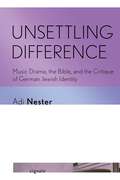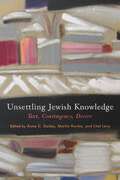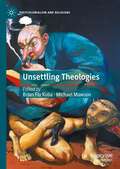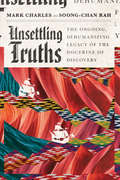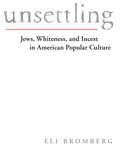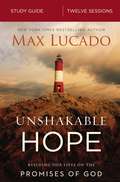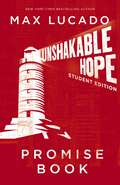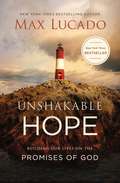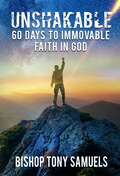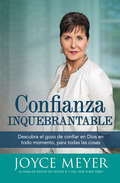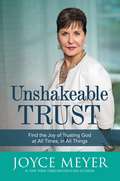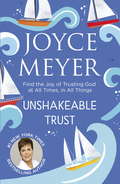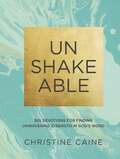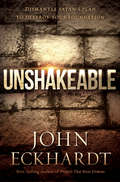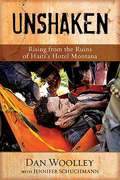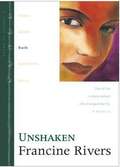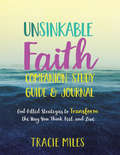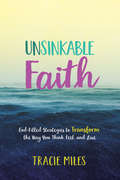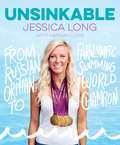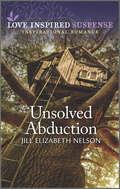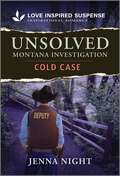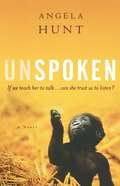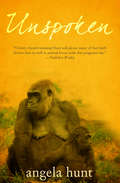- Table View
- List View
Unsettling Difference: Music Drama, the Bible, and the Critique of German Jewish Identity (Signale: Modern German Letters, Cultures, and Thought)
by Adi NesterUnsettling Difference challenges the major-minor pattern that has framed discussions of German Jewish difference, focusing on instances that fall outside traditional understandings of minority culture. Exploring expressions of Jewish identity and difference in biblical-themed musical dramas and their literary sources, Adi Nester argues that the issue of Jewish difference should be treated as an aesthetic question in the first half of the twentieth century, even amid the rise of pseudoscientific theories about race and blood.Drawing on the fraught, parallel histories of opera and the modern reception of the Hebrew Bible in Germany, both significant in debates at the time about the nature of Jewish separateness, Unsettling Difference shows how this discourse troubles concepts of Jewish marginality and (non-Jewish) German dominance. Through innovative readings of key works in this tradition—Rudolf Borchardt's poem, Das Buch Joram; Paul Ben-Haim's oratorio, Joram; Arnold Schoenberg's opera, Moses und Aron; Joseph Roth's novel, Hiob; and Eric Zeisl's opera, Hiob—Nester shows how these biblical adaptations foreground alternative notions of difference that rely on confusion, ambiguity, radical heterogeneity, excess, and repetition.
Unsettling Jewish Knowledge: Text, Contingency, Desire (Jewish Culture and Contexts)
by Anne C. Dailey, Martin Kavka, and Lital LevySpanning the fields of literature, history, philosophy, and theology, Unsettling Jewish Knowledge adopts a fresh approach to the study of Jewish thought and culture. By creatively foregrounding the role of emotions, senses, and the imagination in Jewish experience, the book invites readers to consider what it means for Jewish identity and experience to be constituted outside the frameworks of reasoned thought and inquiry. The collection’s eight essays offer innovative and provocative approaches to a diverse array of topics including modern Jewish-Christian relations, the book of Isaiah, contemporary Jewish fiction, and philosophical meditations on Jewish law. Their bold interpretations of Jewish texts and histories are centered on questions of faith, loss, prejudice, and enchantment—and the darker implications of these questions. The book’s essays also illuminate the importance of desire as a key motivating force in the pursuit of knowledge. Weaving together insights from several disciplines, Unsettling Jewish Knowledge challenges us to grapple with the unexpected, the unconventional, and the uncomfortable aspects of Jewish experience and its representations.Contributors: Anne C. Dailey, John Efron, Yael S. Feldman, Galit Hasan-Rokem, Martin Kavka, Lital Levy, Shaul Magid, Eva Mroczek, Paul E. Nahme, Eli Schonfeld, Shira Stav.
Unsettling Theologies: Memory, Identity, and Place (Postcolonialism and Religions)
by Michael Mawson Brian Fiu KoliaHow can we understand and respond to past and present entanglements of Christianity with colonisation? What kinds of theological perspectives and approaches are needed in the wake of colonisation and its impact? Unsettling Theologies includes responses to these questions from Aboriginal, Māori, Pasifika and White scholars.
Unsettling Truths: The Ongoing, Dehumanizing Legacy of the Doctrine of Discovery
by Soong-Chan Rah Mark CharlesYou cannot discover lands already inhabited.
Unsettling: Jews, Whiteness, and Incest in American Popular Culture
by Eli BrombergBy analyzing how various media told stories about Jewish celebrities and incest, Unsettling illustrates how Jewish community protective politics impacted the representation of white male Jewish masculinity in the 1990s. Chapters on Woody Allen, Roseanne Barr, and Henry Roth demonstrate how media coverage of their respective incest denials (Allen), allegations (Barr), and confessions (Roth) intersect with a history of sexual antisemitism, while an introductory chapter on Jewish second-wave feminist criticism of Sigmund Freud considers how Freud became “white” in these discussions. Unsettling reveals how film, TV, and literature have helped displace once prevalent antisemitic stereotypes onto those who are non-Jewish, nonwhite, and poor. In considering how whiteness functions for an ethnoreligious group with historic vulnerability to incest stereotype as well as contemporary white privilege, Unsettling demonstrates how white Jewish men accused of incest, and even those who defiantly confess it, became improbably sympathetic figures representing supposed white male vulnerability.
Unshakable Hope Bible Study Guide: Building Our Lives on the Promises of God
by Max LucadoThis 12-session video Bible study will help you, your group, and your church stand on the definitive declarations of our mighty and loving God who governs the world according to his great and precious promises.This world has a tremble to it. There are things that seem unsteady in this life. But when we belong to God, it allows us to filter our problems through the promises of God. When we choose to be people of the promise, we choose to build our lives on the promises of God, not the circumstances of life.The stories of the men and women in Scripture were different, but the theme was the same: they were People of the Promise. Because of God&’s promises, Noah built an ark on dry land, Joshua claimed the Promised Land, David became king, Peter preached the first sermon, and John caught a glimpse of the future. Like them, we can also build our lives on God&’s promises, and trust him to keep them.This study guide includes tools for personal study and reflection, video notes, and questions for group discussion.Sessions include:You Are Stamped with God&’s ImageGod Will Win the VictoryYou Are an Heir of GodYour Prayers Have PowerGod Gives Grace to the HumbleGod Gets YouJesus Is Praying for YouDeath Has Been DefeatedJoy Is Coming SoonYou Will Have PowerThere Is No Condemnation in ChristJustice Will PrevailDesigned for use with the Unshakable Hope Video Study (9780310092117), sold separately.
Unshakable Hope Promise Book
by Max LucadoGet to know the God who keeps His promises. Unshakable Hope Promise Book, by bestselling author Max Lucado, explores the promises God made to His people throughout the Bible and how they are relevant to your life today. Get ready to discover the amazing plans and promises God has just for you!What would you do tomorrow if you had no fear? How would you live your life if you knew that the promises in the Bible are for you? What if God Himself put promises there meant for you and has an amazing plan for your life?In Unshakable Hope Promise Book: Student Edition, Max Lucado shows you how God has kept His promises in the lives of His people for all of history. Using examples from biblical characters and current examples from teens like you, Max will help you explore and understand the ways God has kept His promises then and how He keeps them now.Embrace an exciting faith-filled life as you work through stories, Scripture, and journaling questions in Unshakable Hope Promise Book.
Unshakable Hope: Building Our Lives on the Promises of God
by Max LucadoWhat is shaking in your world? Possibly your future, your faith, your family, or finances? It's a shaky world out there. In Unshakable Hope: Building Our Lives on the Promises of God, pastor and New York Times bestselling author Max Lucado offers encouraging guidance for overcoming sadness and despair, renewing a sense of purpose, and triumphantly facing the fears of the future.We’ve never been more educated and entertained. We have technological tools our parents could only dream of, and we are saturated with information, amusement, and recreation. Yet more than ever, we are starving for hope. School shootings are all too familiar. Depression is on the rise. And more people than ever are orchestrating their own deaths. In America alone, the suicide rate has increased 24 percent in fewer than twenty years. If a disease saw such a spike, it would be deemed an epidemic. People are dying from a lack of hope.After forty years of counseling and ministry, Max Lucado has learned that nothing lifts the desperate, weary heart like the promises of God. In a world full of despair, depression, anxiety, and instability, we do not need more opinions or hunches; we need the definitive declarations of our mighty and loving God. Unshakable Hope examines twelve of God’s promises that Max has turned to over the years to encourage himself and others. Each chapter explores one significant promise and reveals how it will equip you to:Overcome challenging circumstancesLive through sadness and renew hopeExperience lasting securityMake wise decisions What is your life built on—the circumstances of life or the promises of God? The answer to that question changes everything. For every problem in life, God has given you a promise. Join Max as he takes a closer look at Scripture’s unbreakable promises and shows you how to live with an unshakable hope.
Unshakable Hope: Building Our Lives on the Promises of God
by Max Lucado*NEW YORK TIMES BESTSELLER* What feels shaky in your world? Are you overwhelmed by the problems you’re facing or the pain you’re feeling?Maybe you feel hurt by the past. Disappointed by the present. Worried about the future. If so, you are not alone, but there is hope. You can live with security and purpose.In Unshakable Hope, Max Lucado unpacks 12 of the Bible’s most significant promises, equipping you to overcome difficult circumstances by keeping your focus on the hope found in the promises of Scripture rather than dwelling on the problems in front of you.For every problem in life, God has given you a promise.Hope is hard to come by these days. Whether it’s heart disease or cancer, job failure or addiction, natural disasters or family disasters, mass murders or mental illness, there are so many reasons to be overwhelmed.In a world full of instability, we do not need more opinions or hunches; we need the definitive declarations of our mighty and loving God.What is your life built on—the circumstances of life or the promises of God? The answer to that question changes everything. Join Max as he takes a closer look at Scripture’s unbreakable promises and shows you how to live with unshakable hope.
Unshakable: 60 Days to Immovable Faith in God
by Tony Samuels"Be strong and of good courage; do not be afraid, nor be dismayed, for the LORD your God is with you wherever you go." ~Joshua 1:9 (NKJV)Let the redeemed of the Lord rise up with the Word of God and in the strength of Holy Spirit fire.Now is the time to take a bold stand for the freedom Jesus died for, to solidify your understanding of who you are created to be, to not shrink back, and not be shaken.Bishop Tony Samuels takes you on a 60-day journey to immovable faith in Christ Jesus. No matter the world's state, your situation, or circumstance in life, God has truly made you unshakable.Let’s get started!About the Author:Bishop Tony Samuels is the President of Lighthouse Gospel Mission. He, along with his wife, Bishop Jeannette Samuels, co-pastor Lighthouse Freedom Center, in Riverview, Florida.
Unshakeable Trust: Find the Joy of Trusting God at All Times, in All Things
by Joyce MeyerIn her new book, New York Times bestselling author Joyce Meyer explores a life lived in complete and total dependence on God. Drawing on her own experiences and inspiration from the Word of God, Joyce makes the case that in every area of your life--spiritually, relationally, emotionally, financially--you can trust that God has your very best in store. With each new chapter, Joyce unveils a sovereign and trustworthy God who longs to be in a relationship with his people, and inspires you to tear down the walls of self-reliance. This book will both equip and encourage, as you learn how to "trust in the Lord with all your heart and lean not on your own understanding." Regardless of your past pain, your present circumstances, or your future uncertainty, when you learn to trust God each day, you'll experience the joy-filled life Jesus came to give you. Others may have let you down . . . but God never will!
Unshakeable Trust: Find the Joy of Trusting God at All Times, in All Things
by Joyce MeyerIn her new book, New York Times bestselling author Joyce Meyer explores a life lived in complete and total dependence on God. Drawing on her own experiences and inspiration from the Word of God, Joyce makes the case that in every area of your life--spiritually, relationally, emotionally, financially--you can trust that God has your very best in store. With each new chapter, Joyce unveils a sovereign and trustworthy God who longs to be in a relationship with his people, and inspires you to tear down the walls of self-reliance. This book will both equip and encourage, as you learn how to "trust in the Lord with all your heart and lean not on your own understanding." Regardless of your past pain, your present circumstances, or your future uncertainty, when you learn to trust God each day, you'll experience the joy-filled life Jesus came to give you. Others may have let you down . . . but God never will!
Unshakeable Trust: Find the Joy of Trusting God at All Times, in All Things
by Joyce MeyerIn her new book, New York Times bestselling author Joyce Meyer explores a life lived in complete and total dependence on God. Drawing on her own experiences and inspiration from the Word of God, Joyce makes the case that in every area of your life--spiritually, relationally, emotionally, financially--you can trust that God has your very best in store.
Unshakeable: 365 Devotions for Finding Unwavering Strength in God’s Word
by Christine CaineGod is bigger than your current story. Bigger than fear or shame or that voice in your head that whispers that you are not enough, too broken, or too flawed. Join Him in a closer relationship—one rooted in truth and Unshakeable. In this daily devotional Christine Caine encourages you to find confidence to live as the person God created you to be.Everything in our world that can be shaken will be shaken. And yet, the Bible assures us it doesn’t matter what happens politically, morally, socially, or economically in the world around us if we have Christ in us—if we have the kingdom of God within us—because His kingdom is Unshakeable.In this daily devotional, bestselling author, speaker and activist Christine Caine will take you on a year-long journey of building your faith in our Unshakeable God. Through inspiring personal stories and powerful scriptures, she will equip you to live boldly and courageously, fully trusting our faithful God. She will inspire you how to activate living your life on mission. Unstoppable. Undaunted. Unashamed. Unshakable. “All of creation will be shaken and removed, so that only unshakable things will remain.”–Hebrews 12:27 NLT
Unshakeable: Dismantle Satan's Plan to Destroy Your Foundation
by John EckhardtWe all know people who sometimes act in polar opposites: the minister who is godly,prayerful, and holy at times, yet has periods of sin and perversion; the person who isoutgoing and cheerful, yet falls into bouts of withdrawal and depression; or the personwho is gentle and kind, yet has periods of outburst and rage. Unshakeable is a teaching unlike any other from best-selling author John Eckhardt onbreaking the most binding, demonic force: double-mindedness. Through this powerfulbook you will develop a firm, Christlike identity that will not be easily shaken by this world.You will learn how to overcome the manifestations of double-mindedness that result in:Broken marriages and divorceIndecision and passivityBitterness and angerHurt and offenseFear and rejectionSpiritually rooted sickness and diseaseAnd much more!
Unshaken: Rising from the Ruins of Haiti’s Hotel Montana
by Dan WoolleyDan Woolley---who spent 65 hrs trapped beneath the rubble of Haiti's Hotel Montana---recounts his experience living through the 7. 0 Haiti earthquake in Unshaken: Rising from the rubble of Haiti's Hotel Montana. After a last-minute hotel switch, no one, not even Dan's wife, knew where he was staying while in Haiti. Trapped in total darkness for nearly three days, with a broken foot, his leg ripped open and a head injury, Dan battled despair, dehydration, anger with God and doubt over whether he would live to see his wife and two young sons again. Woolley had allowed his faith and marriage to weaken in the busyness of life. His entrapment forced him to think about what really mattered. Unshaken includes color photographs and the heartrending reflections from Woolley's wife. Readers will learn new truths from Woolley's themes of spiritual and marital renewal, his key insights into poverty through Compassion International, and his hard-won reminder to embrace every opportunity God gives.
Unshaken: Ruth (Lineage of Grace #3)
by Francine RiversThis is the third of five novellas on the women in the lineage of Jesus Christ. It's a fictionalized account of Ruth's life, based on the bible.
Unsinkable Faith Study Guide: God-Filled Strategies to Transform the Way You Think, Feel, and Live
by Tracie MilesWhen life feels hard, sometimes negative thoughts take over and we find ourselves sinking under their weight. The Unsinkable Faith Study Guide gives you biblical insights that help you change the way you think so you can change the way you feel, which will positively change your life and your destiny. Although it’s not easy, it’s possible to rise above your circumstances, embrace a positive attitude and live with joy and hope, even in the midst of difficult adversities. Whether negative thoughts cause you to sink every day or only once in a while, this companion study to Tracie Miles’ Unsinkable Faith book will help point you to God’s truths so you can rise back to the surface and live a healthier, happier life.
Unsinkable Faith: God-Filled Strategies to Transform the Way You Think, Feel, and Live
by Tracie MilesFor many people, remaining optimistic and feeling positive about themselves and their lives is a constant battle—especially when circumstances are difficult and life is hard. For others, negativity is something that only sneaks up from time to time, yet still wreaks havoc in their hearts. Regardless of the root causes, once pessimistic thoughts permeate our minds, our feelings and emotions begin to control us instead of us controlling them. Eventually it doesn’t seem possible to stay positive, happy, and full of joy, and negative thought patterns shake our faith, causing us to sink emotionally, mentally, and spiritually over time. But it doesn’t have to be that way. Despite what storms roll in, hearts anchored in God don’t sink. When we change the way we think, we can change the way we feel and live, even if our circumstances remain the same. Intentionally embracing the opportunity to experience a transformed heart and a renewed mind opens the door for a changed life, because a positive mind will always lead to a more positive life.In Unsinkable Faith, author and Proverbs 31 Ministries speaker Tracie Miles offers hope for women who struggle with negativity. Each chapter explores Tracie’s and other women’s personal stories, showing how they rose above their circumstances by transforming and renewing their minds. Unsinkable Faith is a breath of fresh air for anyone longing for a heart full of joy, an unbreakable smile, and a new, more optimistic perspective on life. This book will equip you to:Replace pessimism with positive thinking by becoming the captain of your thoughts;Learn how true joy and happiness are based on choice, not circumstances;Overcome unhealthy habits of negative thinking by intentionally implementing three easy mind-renewing steps;Stop feeling hopeless and pitiful, and start feeling hope-filled and powerful instead; andDiscover that when you change the way you think, you change the way feel, and in turn you can change your life completely.
Unsinkable: From Russian Orphan to Paralympic Swimming World Champion
by Jessica LongThe top Paralympic swimmer in the world, Jessica Long delivers an inspirational photographic memoir. Born in Siberia with fibular hemimelia, Jessica Long was adopted from a Russian orphanage at thirteen months old and has since become the second most decorated U.S. Paralympic athlete of all time. Now, Jessica shares all the moments in her life—big and small, heartbreaking and uplifting—that led to her domination in the Paralympic swimming world. This photographic memoir, filled with photographs, sidebars, quotes, and more, will thrill her fans and inspire those who are hearing her story for the first time.
Unsolved Abduction
by Jill Elizabeth NelsonThe answers to a cold case kidnapping lie hidden in her memory Widowed Carina Collins can&’t remember her parents&’ murder or her own childhood kidnapping. But when she and her eighteen-month-old son are attacked in their new home, they must turn to neighbor Ryder Jameson for protection. He&’s convinced Carina&’s mysterious past is colliding with the present. And when uncovered answers bring more questions, all roads point a little too close to home…From Love Inspired Suspense: Courage. Danger. Faith.
Unsolved Montana Investigation (Big Sky First Responders)
by Jenna NightTo crack this cold case… they first must survive. When he rescues emergency dispatcher Clare Barlow from an armed assailant, sheriff&’s deputy Dylan Ruiz finds himself her new partner in her search to uncover her stepmother&’s killer. Digging into this cold case on her own has made Clare a target, and now she needs Dylan&’s help to solve the senseless murder—and keep her alive. Tracking down potential witnesses and evidence brings them closer to the truth, but can they evade an enemy determined to silence them both?From Love Inspired Suspense: Courage. Danger. Faith.Big Sky First Responders Book 1: Deadly Ranch HideoutBook 2: Witness Protection AmbushBook 3: Unsolved Montana Investigation
Unspoken
by Angela Elwell HuntA regular Dr. Dolittle, Glee Granger adores animals. For the past eight years she's taught and loved a young gorilla named Sema. Now the zoo that owns the creature wants custody, and Glee must surrender Sema to a captive environment. But this will change both their lives in unspeakable ways . . . won't it? 336 pages, softcover from WestBow.
Unspoken
by Angela Hunt“What can animals tell us about God? Do animals have souls? . . . Hunt offers a compelling story that asks both questions . . . Poignant” (Publishers Weekly). Glee Granger has spent the last eight years of her life entirely focused on Sema, a gorilla that Glee has been teaching sign language. Though Sema isn’t the first gorilla to use sign language, Glee has pushed their interaction to breakthrough levels. Technically, however, Sema belongs to the zoo where she was born—and the zoo wants its gorilla back. Unwilling to be separated from Sema, Glee joins the zoo staff and sees that it’s not as drastic a change as she first thought. That is until a near-death experience overturns everything Glee thought she knew about humans and animals, the seen and the unseen, the spoken and the unspoken. Suddenly, Glee has become the student and Sema the teacher . . . A Christy Award–winning author, “Hunt knows how to craft believable, interesting characters, and readers will find themselves drawn to the lovable Sema, the conflicted Glee and Glee’s scripture-spouting ‘Nana,’ the proprietor of a Florida motel” (Publishers Weekly).
Unspoken
by Dee HendersonCharlotte Graham is at the center of the most famous kidnapping in Chicago history. The task force of FBI and local cops found her two abductors, killed them, rescued her, but it took four very long years. The fact she was found less than three miles from her home, had been there the entire time, haunts them. She's changed her identity, found a profession she loves, and rebuilt her life. "She's never said a word--to the cops, to her doctors, to family--about those four years. "A family legacy has brought her back to Chicago where a reporter is writing a book about the kidnapping. The cops who worked the case are cooperating with him. Her options are limited: Hope the reporter doesn't find the full truth, or break her silence about what happened. And her silence is what has protected her family for years. Bryce Bishop doesn't know her past, he only knows she has coins to sell from her grandfather's estate--and that the FBI director for the Chicago office made the introduction. The more he gets to know Charlotte, the more interested he becomes, an interest encouraged by those closest to her. But nothing else is working in his favor--she's decided she is single for life, she struggles with her faith, and she's willing to forego a huge inheritance to keep her privacy. She's not giving him much of an opening to work with. Charlotte wants to trust him. She needs to tell him what happened. Because a crime cops thought was solved, has only opened another chapter. . .
